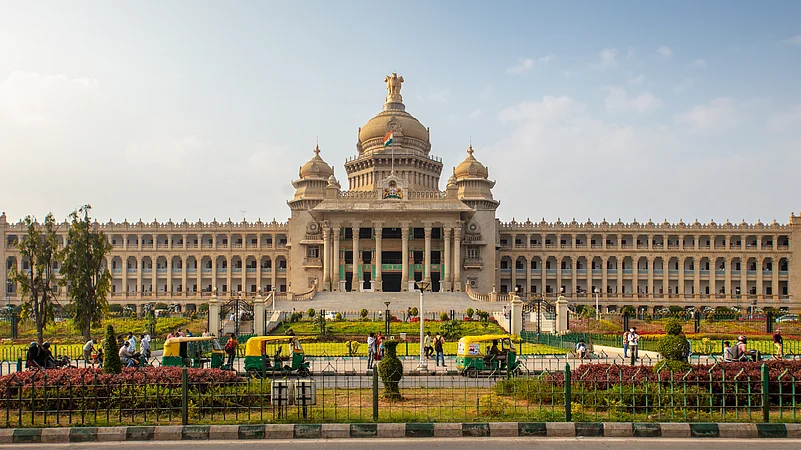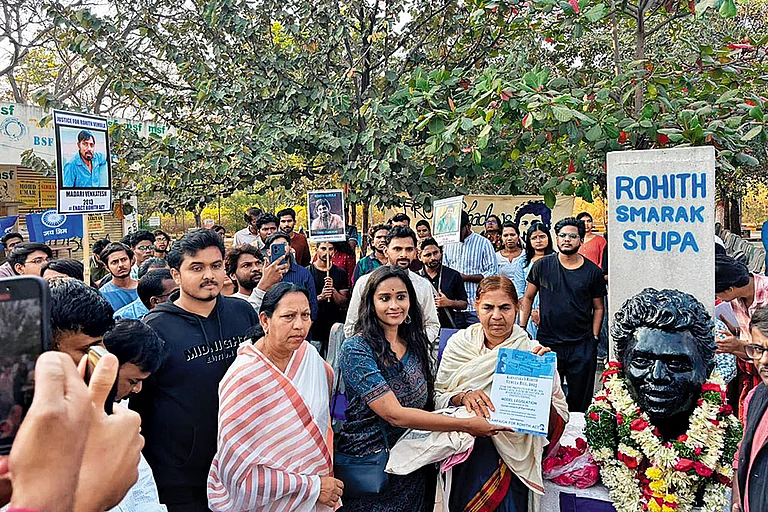
The draft bill defines indirect and institutional discrimination, mandates equity committees on campuses, and provides both civil remedies and penal action for violations
While the BJP argues existing laws are sufficient, social justice activists say the bill is essential to address deep-rooted, systemic caste bias in the education sector
Karnataka Congress, in its election manifesto, promised to enact a law in Rohit Vemula’s name to address caste discrimination
The Karnataka government has decided to introduce a bill to curb discrimination against Scheduled Caste and Scheduled Tribe students on educational campuses. The proposed legislation, named after Rohit Vemula—the University of Hyderabad scholar whose death in 2016 triggered a national debate on caste bias in higher education—seeks to impose stringent penalties on individuals and institutions found guilty of discriminating against or perpetrating atrocities on SC/ST students. The bill is expected to be tabled during the next session of the Legislative Assembly, scheduled to begin in the second week of December.
The initiative reflects a key commitment made by the Congress in its 2024 Lok Sabha election manifesto, in which the party pledged to enact the Rohit Vemula Bill to address systemic discrimination faced by Dalit students across the country. A similar promise was included in the Congress manifesto for the 2023 Karnataka Assembly election, signalling the party’s intent to push for concrete legal safeguards.
In July, Rahul Gandhi had written to Congress chief ministers Siddaramaiah and A. Revanth Reddy, urging them to bring forward state-level legislation to prevent caste discrimination on university and college campuses.
What is the Karnataka bill?
The bill, titled The Karnataka Rohith Vemula (Prevention of Exclusion or Injustice) (Right to Education and Dignity) Bill, 2025, aims to address caste-based discrimination within the state’s education sector. Although the Congress had promised such legislation in its election manifesto, the government delayed its introduction. According to reports, Leader of the Opposition Rahul Gandhi recently wrote to Chief Minister Siddaramaiah, urging him to expedite the process. The government is now expected to table the bill in the upcoming Assembly session beginning in December.
What are the provisions in the bill?
The bill identifies two categories of discrimination—institutional and indirect. Indirect discrimination refers to actions that may appear neutral or free of caste prejudice on the surface but ultimately have adverse effects on individuals or groups belonging to SC/ST communities. Institutional discrimination, on the other hand, is structural, rooted in statutory mandates or the functioning of governing bodies, research committees, and other institutional mechanisms that act against the interests of SC/ST students.
According to The Indian Express, the bill proposes civil remedies for survivors of discrimination and prescribes penalties for perpetrators of harassment. It also mandates the formation of an equity committee within every educational institution—modelled on the Internal Complaints Committee (ICC) for sexual harassment cases—to receive complaints of caste-based discrimination. Complaints unresolved at the institutional level may then be escalated to the courts.
The bill further distinguishes between atrocities and discrimination. It defines an atrocity as any act listed under Section 3 of the Scheduled Castes and Scheduled Tribes (Prevention of Atrocities) Act, 1989, including subsequent amendments.
What are the punishments in the bill?
For acts of discrimination, the bill prescribes a graded system of penalties, beginning with a written apology as the minimum punishment. In contrast, offences classified as atrocities attract significantly harsher penalties. According to reports, a first offence under the atrocity provisions carries a maximum imprisonment of 1 year, a fine of Rs 10,000, and the possibility of court-ordered compensation of up to Rs 1 lakh to the victim. A repeat offence will invite a three-year jail term along with a Rs 1 lakh fine.
If an institution itself is found to have discriminatory provisions or practices, it may be fined anywhere between Rs 1 lakh and Rs 10 lakh, depending on the severity of the violation. Additionally, the bill empowers the state government to withhold all financial aid and grants to such institutions.
Is the bill controversial?
Yes, the opposition to the bill comes primarily from the BJP. The party argues that existing laws already provide adequate mechanisms to address caste discrimination, and that certain stringent provisions in the draft bill could lead to “reverse discrimination.” However, social justice activists contend that the legislation is a necessary step forward, insisting that stronger measures are essential to confront the deep-rooted and systemic caste discrimination that continues to pervade the education sector.
Who was Rohit Vemula
Rohit Vemula, a PhD scholar at the University of Hyderabad, died by suicide in his hostel room on January 17, 2016. He had been expelled from the hostel following clashes between his organisation, the Ambedkar Students’ Association (ASA), and the RSS-affiliated student body, ABVP. His death sparked massive protests across the country, drawing attention to the caste discrimination allegedly prevalent in educational institutions. Rohit’s poignant suicide note—particularly the line, “My birth is my fatal accident”—continues to echo through university campuses and among all those who strive for a society free of discrimination.



























